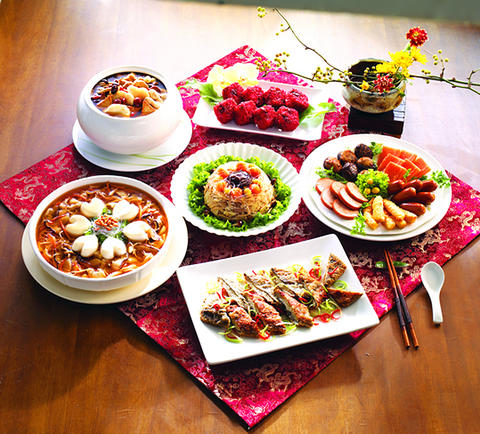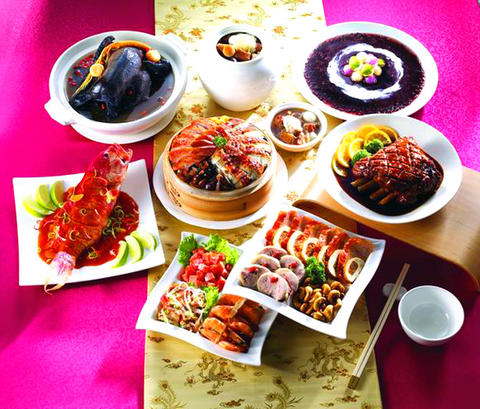The Lunar New Year has many traditions associated with it, and while many of these are gradually being thrown out the window by a generation too preoccupied to bother, the New Year's Eve family dinner remains entrenched in Taiwanese society. All kinds of dishes, many of them bad for the waistline and blood pressure, are essential to see in the New Year properly, for, as we are told, each dish has important symbolic significance.
The first dish on a New Year's Eve menu is often a cold mixed platter, usually with a choice of five types of food. Regularly to be seen are haizhepi (海哲皮), shrimp, stewed beef, tripe and cold-cuts of chicken. It's the number of choices rather than what's on the plate that is significant in this case. This dish is a reference to the phrase "may you be granted the five blessing" (五福臨門, wufulinmen), a commonly used auspicious saying. There is some debate as to exactly what the five blessings are, but the most commonly accepted version includes longevity, prosperity, official status, joy and numerous offspring.
Fish is an absolute must at the New Year's Eve table, largely because of a homophone. The word fish (魚, yu) sounds the same as "surplus" (餘, yu), so the eating of fish represents the hope that the following year will be one of abundance. The type of fish and the manner in which it is cooked are left to the discretion of the chef.

PHOTO COURTESY OF PRESIDENT CONVENIENCE STORES
A whole chicken is also often thought a necessary part of the meal. This is partly due to a kind of rhyming aphorism in Hoklo (commonly known as Taiwanese), "Eat a chicken, establish a home" (吃雞起家, chiah ke, khi ke), which doesn't make a lot of sense in English when translated directly, but given that the holiday is a time for families to get together, the concept of family unity can be read into almost anything. (Meatballs are another popular way of expressing this in the language of food, simply because they are round.) The use of specially bred black-boned chickens gives the dish additional cachet, as this variety is thought to have medicinal properties that will fortify the body against winter weather.
Fortunately, given the excess of fish and meat that is served up at most Lunar New Year's Eve dinners, a number of vegetables also have auspicious references.
Mustard greens are commonly consumed during the holiday because in Chinese they are called "long years vegetable" (長年菜, changniancai), an auspicious reference to living to a ripe old age.

PHOTO COURTESY OF PRESIDENT CONVENIENCE STORES
Fat choy (髮菜), also known as hair moss (Latin name: Nostoc flagelliforme), a dried fungus harvested in the high deserts of Central Asia, is another common food. It's expensive, adding a certain prestige, but the main reason for its inclusion is that in Cantonese, the name of the vegetable is a homophone for "get rich," which is presumably what everybody is hoping to do as soon as the festivities are over.
It's not only expensive foods that make the cut; the radish is also traditionally part of the meal. In Hoklo, radish (菜頭, chhai-thau) is a homophone for "good fortune" (好彩頭 ho-chhai-thau). To ensure that the radish isn't embarrassed because of its humble origins, it's often served as radish cake, which dresses the vegetable up with shrimp, dried mushrooms and other more costly ingredients.
These are just some of the associations between food and folklore that are brought to the fore over the Lunar New Year, but the ultimate demand is that the food be exotic and varied. For this reason, one of the most popular choices is the dish "Buddha jumps over the wall" (佛跳牆, fotiaoqiang), a Minnan (閩南) stew or soup made of quail eggs, bamboo shoots, scallops, sea cucumbers, abalone, shark fin, chicken, ham, pork tendon, ginseng, mushrooms and taro, all cooked in a wine-based soup. It got its name from a story in which a Buddhist monk forgot his vows (which include not eating meat) and jumped over a garden wall to get a taste of this dish. The concoction comes in many forms and ranges in price from a few hundred NT dollars to many thousands. This show-off stew has no particular traditional relationship with the Lunar New Year other than providing almost limitless opportunities for the addition of pricey and exotic ingredients.
Preparing all of this food entails a good deal of cooking, and few families in urban centers have time to make such elaborate preparations. According to a study commissioned by the President Chain Stores (統一超商), which operates the 7-Eleven convenience store franchise, 75 percent of families in Taiwan now get takeout for New Year's Eve. The company has responded, as has virtually every other convenience store and hypermarket chain, with a huge selection of pre-ordered, pre-cooked and pre-packaged banquets. Restaurants, too, are currently accepting bookings and takeout orders for New Year's Eve foods and if you are looking to celebrate in traditional style without the hassle of cooking yourself, you should probably start getting your orders in now.

That US assistance was a model for Taiwan’s spectacular development success was early recognized by policymakers and analysts. In a report to the US Congress for the fiscal year 1962, former President John F. Kennedy noted Taiwan’s “rapid economic growth,” was “producing a substantial net gain in living.” Kennedy had a stake in Taiwan’s achievements and the US’ official development assistance (ODA) in general: In September 1961, his entreaty to make the 1960s a “decade of development,” and an accompanying proposal for dedicated legislation to this end, had been formalized by congressional passage of the Foreign Assistance Act. Two

Despite the intense sunshine, we were hardly breaking a sweat as we cruised along the flat, dedicated bike lane, well protected from the heat by a canopy of trees. The electric assist on the bikes likely made a difference, too. Far removed from the bustle and noise of the Taichung traffic, we admired the serene rural scenery, making our way over rivers, alongside rice paddies and through pear orchards. Our route for the day covered two bike paths that connect in Fengyuan District (豐原) and are best done together. The Hou-Feng Bike Path (后豐鐵馬道) runs southward from Houli District (后里) while the

On March 13 President William Lai (賴清德) gave a national security speech noting the 20th year since the passing of China’s Anti-Secession Law (反分裂國家法) in March 2005 that laid the legal groundwork for an invasion of Taiwan. That law, and other subsequent ones, are merely political theater created by the Chinese Communist Party (CCP) to have something to point to so they can claim “we have to do it, it is the law.” The president’s speech was somber and said: “By its actions, China already satisfies the definition of a ‘foreign hostile force’ as provided in the Anti-Infiltration Act, which unlike

Mirror mirror on the wall, what’s the fairest Disney live-action remake of them all? Wait, mirror. Hold on a second. Maybe choosing from the likes of Alice in Wonderland (2010), Mulan (2020) and The Lion King (2019) isn’t such a good idea. Mirror, on second thought, what’s on Netflix? Even the most devoted fans would have to acknowledge that these have not been the most illustrious illustrations of Disney magic. At their best (Pete’s Dragon? Cinderella?) they breathe life into old classics that could use a little updating. At their worst, well, blue Will Smith. Given the rapacious rate of remakes in modern